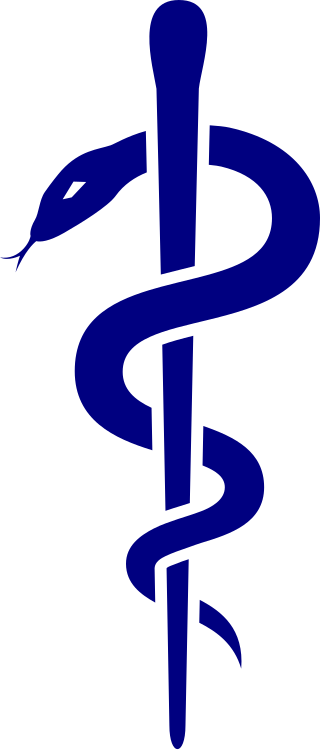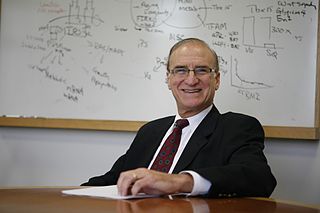Related Research Articles

Medicine is the science and practice of caring for a patient, managing the diagnosis, prognosis, prevention, treatment, palliation of their injury or disease, and promoting their health. Medicine encompasses a variety of health care practices evolved to maintain and restore health by the prevention and treatment of illness. Contemporary medicine applies biomedical sciences, biomedical research, genetics, and medical technology to diagnose, treat, and prevent injury and disease, typically through pharmaceuticals or surgery, but also through therapies as diverse as psychotherapy, external splints and traction, medical devices, biologics, and ionizing radiation, amongst others.

Naturopathy, or naturopathic medicine, is a form of alternative medicine. A wide array of pseudoscientific practices branded as "natural", "non-invasive", or promoting "self-healing" are employed by its practitioners, who are known as naturopaths. Difficult to generalize, these treatments range from the thoroughly discredited, like homeopathy, to the widely-accepted, like certain forms of psychotherapy. The ideology and methods of naturopathy are based on vitalism and folk medicine rather than evidence-based medicine, although practitioners may use techniques supported by evidence. The ethics of naturopathy have been called into question by medical professionals and its practice has been characterized as quackery.

Medical cannabis, or medical marijuana (MMJ), is cannabis and cannabinoids that are prescribed by physicians for their patients. The use of cannabis as medicine has not been rigorously tested due to production and governmental restrictions, resulting in limited clinical research to define the safety and efficacy of using cannabis to treat diseases.
Drug withdrawal, drug withdrawal syndrome, or substance withdrawal syndrome, is the group of symptoms that occur upon the abrupt discontinuation or decrease in the intake of pharmaceutical or recreational drugs.
International emergency medicine is a subspecialty of emergency medicine that focuses not only on the global practice of emergency medicine but also on efforts to promote the growth of emergency care as a branch of medicine throughout the world. The term international emergency medicine generally refers to the transfer of skills and knowledge—including knowledge of ambulance operations and other aspects of prehospital care—from developed emergency medical systems (EMSs) to those systems which are less developed. However, this definition has been criticized as oxymoronic, given the international nature of medicine and the number of physicians working internationally. From this point of view, international emergency medicine is better described as the training required for and the reality of practicing the specialty outside of one's native country.
The Canadian Medical Association is a national, voluntary association of physicians and medical learners that advocates on national health matters. Its primary mandate is to drive positive change in health care by advocating on key health issues facing doctors and their patients.

Eastern Virginia Medical School (EVMS) is a public medical school in Norfolk, Virginia. Founded by grassroots efforts in the Southeastern part of Virginia known as Hampton Roads, EVMS is not affiliated with an undergraduate institution and coordinates training through multiple medical centers in the Hampton Roads region. EVMS campus includes the 555-bed Sentara Norfolk General Hospital, the region's only tertiary level 1 trauma medical care facility, and the 212-bed Children's Hospital of The King's Daughters, a regional pediatric referral care facility and only stand-alone children's hospital in the state. EVMS is the first institution in the US to have produced a viable fetus through in vitro fertilization. EVMS is most known for its reproductive medicine and simulation/standardized-patient education as well as research in pediatrics, geriatrics, diabetes, and cancer. In addition, EVMS is well known for its leadership in community service and medical missions as evidenced by faculty and alumni responsible for the founding of Operation Smile, Physicians for Peace, Global Brigades, and CONRAD.

The University of Minnesota Medical School is an accredited medical school at the University of Minnesota. It is a combination of two campuses located in Minneapolis and Duluth, Minnesota.

Richard Ballon Goldbloom, was a Canadian pediatrician, university professor, and the fifth chancellor of Dalhousie University. Born in Montreal, Quebec, he was educated at Selwyn House School and Lower Canada College. He received a Bachelor of Science degree in 1945 and a Doctor of Medicine degree in 1949 from McGill University. He did his post-graduate medical education at the Royal Victoria Hospital, the Montreal Children's Hospital and the Children's Hospital Boston. From 1964 to 1967, he was an associate professor at McGill University and a physician at the Montreal Children's Hospital. From 1967 to 1985, he was the head of Dalhousie University's Department of Pediatrics. He was the first physician-in-chief and director of research at the Izaak Walton Killam Hospital for Children in Halifax, Nova Scotia.
Addiction medicine is a medical subspecialty that deals with the diagnosis, prevention, evaluation, treatment, and recovery of persons with addiction, of those with substance-related and addictive disorders, and of people who show unhealthy use of substances including alcohol, nicotine, prescription medicine and other illicit and licit drugs. The medical subspecialty often crosses over into other areas, since various aspects of addiction fall within the fields of public health, psychology, social work, mental health counseling, psychiatry, and internal medicine, among others. Incorporated within the specialty are the processes of detoxification, rehabilitation, harm reduction, abstinence-based treatment, individual and group therapies, oversight of halfway houses, treatment of withdrawal-related symptoms, acute intervention, and long term therapies designed to reduce likelihood of relapse. Some specialists, primarily those who also have expertise in family medicine or internal medicine, also provide treatment for disease states commonly associated with substance use, such as hepatitis and HIV infection.
Stuart Gitlow is a general, forensic, and addiction psychiatrist and Past President of the American Society of Addiction Medicine.

Kansas City University (KCU) is a private medical school with its main campus in Kansas City, Missouri and an additional campus in Joplin, Missouri. Founded in 1916, KCU is one of the original osteopathic medical schools in the United States. It consists of both a College of Osteopathic Medicine and a College of Biosciences. KCU is one of the largest medical schools in the nation by enrollment.
Doctor of Osteopathic Medicine is a medical degree conferred by the 38 osteopathic medical schools in the United States. DO and Doctor of Medicine (MD) degrees are equivalent: a DO graduate may become licensed as a physician or surgeon and thus have full medical and surgical practicing rights in all 50 US states. As of 2021, there were 168,701 osteopathic physicians and medical students in DO programs across the United States. Osteopathic medicine emerged historically from osteopathy, but has become a distinct profession.
Case Western Reserve School of Medicine is the medical school of Case Western Reserve University, a private research university in Cleveland, Ohio. It is the largest biomedical research center in Ohio. CWRU SOM is primarily affiliated with the Cleveland Clinic, ranked the world’s second-best hospital in 2023. It is also affiliated with University Hospitals Cleveland Medical Center.

Dr. Kamiar Alaei and his brother Dr. Arash Alaei are two Iranian HIV/AIDS doctors who were detained in Tehran's Evin prison from June 2008 through Dec 2010 and August 2011, respectively. Prior to their arrest, they developed harm-reduction programs in Iran and developed the program Global Health in the Middle East and Central Asia, an HIV/AIDS training program for regional health experts.

The Wilderness Medical Society was created on 15 February 1983 by three physicians from California, United States — Dr. Paul Auerbach, Dr. Ed Geehr, and Dr. Ken Kizer. It is the largest international non-profit membership organization devoted to addressing wilderness medicine challenges, more specifically defined as "medical care delivered in those areas where fixed or transient geographic challenges reduce availability of, or alter requirements for, medical or patient movement resources". It also publishes Wilderness & Environmental Medicine Journal, Wilderness Medicine Magazine, and Wilderness Medicine Clinical Practice Guidelines.

The International Federation of Medical and Biological Engineering (IFMBE) was initially formed as International Federation for Medical Electronics and Biological Engineering during the 2nd International Conference of Medical and Biological Engineering, in the UNESCO Building, Paris, France in 1959. It is primarily a federation of national and transnational organizations. These organizations represent national interests in medical and biological engineering.
California Society of Addiction Medicine (CSAM) is the California organization of physicians who specialize in treating addiction. Addiction medicine is the medical specialty that provides care and treatment for people with substance use disorder. It includes both pharmaceutical and behavioral treatments and aligns with other specialties including public health, psychiatry and internal medicine. CSAM was founded in 1973, and has been a State Chapter of the American Society of Addiction Medicine since 1989.

Choosing Wisely is a United States-based health educational campaign, led by the ABIM Foundation, about unnecessary health care.

Carl Ronald Kahn is an American physician and scientist, best known for his work with insulin receptors and insulin resistance in diabetes and obesity. He is the Chief Academic Officer at Joslin Diabetes Center, the Mary K. Iacocca Professor of Medicine at Harvard Medical School and a member of the National Academy of Sciences since 1999.
References
- ↑ "ISAM".
- ↑ "ISAM bridging medical evidences".
- ↑ "Conference Ref 2013". Archived from the original on 2013-06-07. Retrieved 2013-08-16.
- ↑ "Conference Ref". Archived from the original on October 28, 2013.
- ↑ "International Conference".[ permanent dead link ]
- ↑ "Painkiller Addiction: Side-Effects & Risks". 2022-08-02. Retrieved 2023-05-02.
- ↑ "Annual Meeting". Archived from the original on 2013-08-16. Retrieved 2020-01-25.
- ↑ "ISAM aim". Archived from the original on 2012-12-25. Retrieved 2013-08-16.